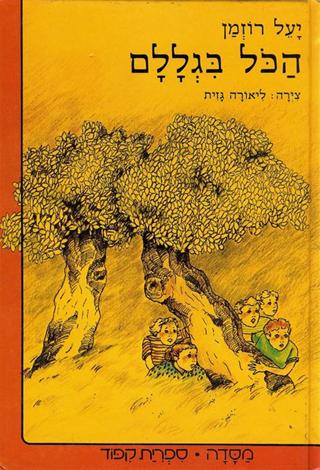
It’s All Their Fault
A winner of the Ze’ev Prize, this absorbing and spirited novel describes how a young guest from the city helps to solve a bitter feud over a plot of land. When Zrubavela comes to stay with her uncle at his agricultural settlement in the Jezreel Valley, the animosity between her uncle’s village and the adjacent kibbutz is so great, that normal neighborly relations have ended: spare parts cannot be borrowed and the pool is not shared. Together with the village kids, Zrubavela roasts and eats the delicious fish they have poached from the kibbutz, yet she also visits the kibbutz on the sly, swims in the pool, and meets the handsome Chen.
Zrubavela hides her kibbutz connections from her village friends. She does not reveal that she is named after her grandfather Zrubavel, one of the founders of the kibbutz, or that she visited his grave in the kibbutz. She also keeps secret her visit to her mother’s kibbutz friend, and the discovery that she is Chen`s mother. The feud is resolved only when calamity strikes. Zrubavela becomes very ill, and a boy is seriously injured during a fight between the two gangs. While the children are in danger, the village and kibbutz come together: they all gather on the lawn outside the infirmary waiting for news. The piece of land that adults and children had fought over – a small crescent-shaped plot nicknamed “the banana” – seems easy to share once the two sides agree to cooperate. In the end, Zrubavela’s problems are also resolved; she need not go back to another boring year in the city, because her parents agree to let her stay in the village.
The narrator’s tone is humorous and frank: the lesson is clear, but it never moralizes. Rosman’s sympathy for the children is consistent, whether they are raiding each other, planning a hermit`s camp in the middle of the woods, rebelling against their parents or making peace with the other camp.

